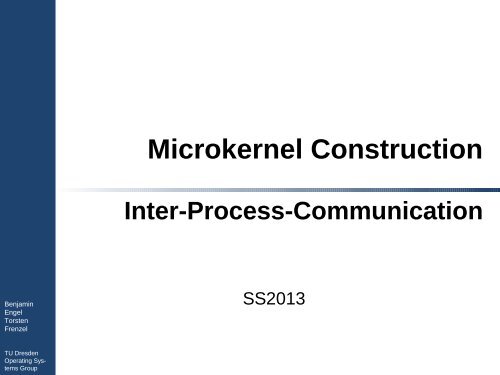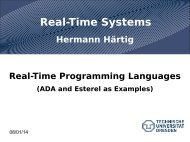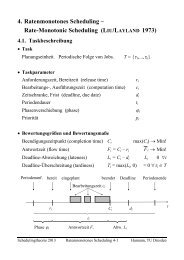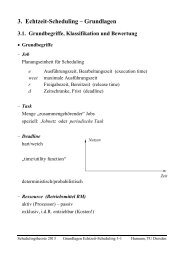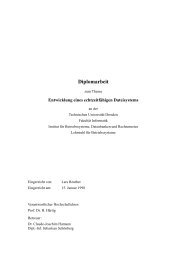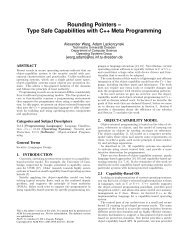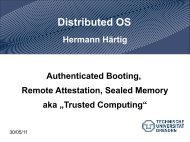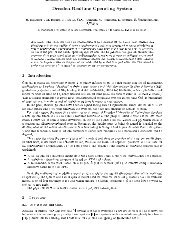Inter-Process-Communication - Operating Systems Group
Inter-Process-Communication - Operating Systems Group
Inter-Process-Communication - Operating Systems Group
Create successful ePaper yourself
Turn your PDF publications into a flip-book with our unique Google optimized e-Paper software.
Benjamin<br />
Engel<br />
Torsten<br />
Frenzel<br />
TU Dresden<br />
<strong>Operating</strong> <strong>Systems</strong><br />
<strong>Group</strong><br />
Microkernel Construction<br />
<strong>Inter</strong>-<strong>Process</strong>-<strong>Communication</strong><br />
SS2013
Microkernel<br />
Construction<br />
Benjamin<br />
Engel<br />
Torsten<br />
Frenzel<br />
TU Dresden<br />
<strong>Operating</strong> <strong>Systems</strong><br />
<strong>Group</strong><br />
Use Cases<br />
Generally in microkernels:<br />
– Control transfer (synchronization)<br />
– Data transfer (send/receive data)<br />
Specifically<br />
– Grant access to resources (memory, io-ports, capabilities)<br />
– Manage and handle page faults, interrupts and other resources<br />
– Timeouts<br />
– Yield CPU (sleep)<br />
Allows feature-rich user-level protocols on top<br />
– Tailored for client/server communication<br />
– Microkernel talks some simple protocols to support user applications<br />
(page fault IPC, exception IPC)<br />
Optimized for performance<br />
2
Microkernel<br />
Construction<br />
Benjamin<br />
Engel<br />
Torsten<br />
Frenzel<br />
TU Dresden<br />
<strong>Operating</strong> <strong>Systems</strong><br />
<strong>Group</strong><br />
System calls<br />
– Monolithic kernel: 2 kernel entries/exits<br />
– Microkernel: 4 kernel entries/exits + 2 context switches<br />
Application<br />
Driver<br />
Monolithic kernel<br />
Hardware<br />
Application<br />
Microkernel<br />
Driver<br />
1 4<br />
2 3<br />
Hardware<br />
3
Microkernel<br />
Construction<br />
Benjamin<br />
Engel<br />
Torsten<br />
Frenzel<br />
TU Dresden<br />
<strong>Operating</strong> <strong>Systems</strong><br />
<strong>Group</strong><br />
Calls between system services<br />
– Monolithic kernel: 1 function call<br />
– Microkernel: 4 kernel entries/exits + 2 context switches<br />
Network<br />
Subsystem<br />
Monolithic kernel<br />
Hardware<br />
Driver<br />
Network<br />
Subsystem<br />
Microkernel<br />
Driver<br />
1 4<br />
2 3<br />
Hardware<br />
4
Microkernel<br />
Construction<br />
Benjamin<br />
Engel<br />
Torsten<br />
Frenzel<br />
TU Dresden<br />
<strong>Operating</strong> <strong>Systems</strong><br />
<strong>Group</strong><br />
POSIX IPC Primitives<br />
Semaphore<br />
– Atomic increment and decrement of counter with wait queue<br />
– Used to synchronize critical sections<br />
Shared memory<br />
– Special file type, that uses physical memory<br />
Message queue<br />
– Special file type for block-based synchronous communication<br />
Pipe<br />
– Untyped, directed communication channel<br />
FIFO<br />
– Special file type similar to a pipe<br />
– Blocking and non-blocking mode<br />
Regular files<br />
Signals<br />
– Asynchronous trigger; many have predefined actions<br />
5
Microkernel<br />
Construction<br />
Benjamin<br />
Engel<br />
Torsten<br />
Frenzel<br />
TU Dresden<br />
<strong>Operating</strong> <strong>Systems</strong><br />
<strong>Group</strong><br />
Recap: Thread Switch<br />
Address Space<br />
User<br />
Stack A<br />
User<br />
Stack<br />
Kernel<br />
Stack A<br />
TCB A<br />
Kernel<br />
User<br />
Stack<br />
Address Space<br />
User<br />
Stack B<br />
Kernel<br />
Stack B<br />
TCB B<br />
Enter Kernel<br />
Switch A → B<br />
Exit Kernel<br />
6
Microkernel<br />
Construction<br />
Benjamin<br />
Engel<br />
Torsten<br />
Frenzel<br />
TU Dresden<br />
<strong>Operating</strong> <strong>Systems</strong><br />
<strong>Group</strong><br />
Send Message (async)<br />
Address Space<br />
User<br />
Stack A<br />
User<br />
Stack<br />
Kernel<br />
Stack A<br />
TCB A<br />
MSG<br />
Kernel<br />
User<br />
Stack<br />
Address Space<br />
User<br />
Stack B<br />
Kernel<br />
Stack B<br />
TCB B<br />
Send<br />
Prepare Message<br />
Enter Kernel<br />
Allocate in-kernel<br />
message buffer<br />
Copy message in<br />
Find Receiver and tag<br />
new msg available<br />
Exit Kernel<br />
Receive<br />
Enter Kernel<br />
Copy message out to<br />
user memory<br />
Free in-kernel message<br />
buffer<br />
Exit Kernel<br />
7
Microkernel<br />
Construction<br />
Benjamin<br />
Engel<br />
Torsten<br />
Frenzel<br />
TU Dresden<br />
<strong>Operating</strong> <strong>Systems</strong><br />
<strong>Group</strong><br />
IPC Properties and Terms<br />
Connectionless vs. connection-oriented<br />
– What is the order of delivered messages<br />
Reliable vs. Unreliable<br />
– Can a message get lost<br />
Point-to-point vs broadcast or multicast<br />
– How many receiver can be addressed<br />
Asynchronous vs. synchronous<br />
– Does the sender wait for the receiver<br />
Buffer vs. unbuffered<br />
– Message buffering within the kernel<br />
Direct vs. indirect<br />
– How is the destination addressed<br />
Data items<br />
– What type of data items are transferred<br />
8
Microkernel<br />
Construction<br />
Benjamin<br />
Engel<br />
Torsten<br />
Frenzel<br />
TU Dresden<br />
<strong>Operating</strong> <strong>Systems</strong><br />
<strong>Group</strong><br />
Synchronous vs. Asynchronous IPC<br />
Synchronous IPC<br />
– Sender blocks if receiver is not ready<br />
– Requires no data buffering inside the kernel<br />
– Wait queue for every receiving thread<br />
• Holds blocked senders for the receiver<br />
• Requires enqueue/deqeue policy<br />
Asynchronous IPC<br />
– Sender does not block if receiver is not ready<br />
– Requires data buffering inside the kernel<br />
– Suitable for interrupts because only one bit is transferred<br />
9
Microkernel<br />
Construction<br />
Benjamin<br />
Engel<br />
Torsten<br />
Frenzel<br />
TU Dresden<br />
<strong>Operating</strong> <strong>Systems</strong><br />
<strong>Group</strong><br />
Direct vs. Indirect IPC<br />
Direct IPC:<br />
– Sending thread addresses another thread<br />
Indirect IPC:<br />
– Sending thread addresses communication object (called: port, portal,<br />
gate, endpoint)<br />
– IPC object redirects message to a receiver thread<br />
– Advantage 1: Hide the implementation of server threads<br />
– Advantage 2: Possibility to hold state for client-server connection<br />
Client thread<br />
Client thread<br />
IPC object<br />
Identification<br />
IPC object<br />
IPC object<br />
Server thread<br />
Server thread<br />
Server thread<br />
10
Microkernel<br />
Construction<br />
Benjamin<br />
Engel<br />
Torsten<br />
Frenzel<br />
TU Dresden<br />
<strong>Operating</strong> <strong>Systems</strong><br />
<strong>Group</strong><br />
IPC Primitives<br />
Send<br />
– Send to specific thread/IPC object<br />
Closed receive<br />
– Receive from specific thread<br />
Open receive<br />
– Receive from any thread<br />
Send and closed wait (“call”)<br />
– Send to and receive from specific thread/IPC object<br />
– Typical client operation<br />
Send and open receive (“reply-and-wait”)<br />
– Receive from any thread and send to specific thread<br />
– Typical server operation<br />
Sleep<br />
– Neither send nor receive<br />
– Yield until timeout expires<br />
11
Microkernel<br />
Construction<br />
Benjamin<br />
Engel<br />
Torsten<br />
Frenzel<br />
TU Dresden<br />
<strong>Operating</strong> <strong>Systems</strong><br />
<strong>Group</strong><br />
Switching from Send to Receive<br />
Switch from send part to receive part atomically<br />
Why prepare receive part atomically?<br />
– Servers do not trust clients<br />
➔ Servers reply with timeout zero<br />
➔ Client needs to be ready to receive immediately after sending<br />
➔ Flip one bit to switch from send to receive part<br />
Client thread<br />
Kernel<br />
Server thread<br />
call call<br />
Switch<br />
atomically<br />
Send with<br />
Timeout zero<br />
wait reply and wait reply<br />
12
Microkernel<br />
Construction<br />
Benjamin<br />
Engel<br />
Torsten<br />
Frenzel<br />
TU Dresden<br />
<strong>Operating</strong> <strong>Systems</strong><br />
<strong>Group</strong><br />
Example: Mutual Exclusion with IPC<br />
User-level protocol provides mutual exclusion:<br />
– Synchronization thread protects critical section<br />
– Worker thread calls synchronization thread before entering<br />
– Synchronization thread replies if critical section can be entered<br />
– Worker thread blocks if critical section not available<br />
– Worker thread calls synchronization thread after leaving<br />
– Synchronization thread sends reply to next waiting worker thread<br />
Implementation not optimal for performance but correct<br />
Others:<br />
– Producer-consumer synchronization together with shared memory<br />
– Connection-oriented client-server communication<br />
13
Microkernel<br />
Construction<br />
Benjamin<br />
Engel<br />
Torsten<br />
Frenzel<br />
TU Dresden<br />
<strong>Operating</strong> <strong>Systems</strong><br />
<strong>Group</strong><br />
IPC Types<br />
Register-only IPC<br />
– Very fast but amount of data is limited to number of registers<br />
UTCB IPC<br />
– User Thread Control Block: user accessible, kernel-provided and<br />
pinned page, message buffer without page faults (guaranteed)<br />
– Copy data from one UTCB to another UTCB<br />
– Fast but amount of data is limited to UTCB size<br />
User-memory IPC<br />
– Copy of memory areas between user address-spaces<br />
– Amount of data is not limited<br />
– Page faults can occur<br />
Flexpage IPC<br />
– Mapping of memory areas and capabilities<br />
– Page fault IPC is special case<br />
<strong>Inter</strong>rupt IPC<br />
– Relaying <strong>Inter</strong>rupts and Exceptions as messages<br />
14
Microkernel<br />
Construction<br />
Benjamin<br />
Engel<br />
Torsten<br />
Frenzel<br />
TU Dresden<br />
<strong>Operating</strong> <strong>Systems</strong><br />
<strong>Group</strong><br />
User-Memory IPC with Kernel Buffer<br />
Two copy operations<br />
– Copy send buffer to kernel buffer in sender's address space<br />
– Switch to receiver's address space<br />
– Copy kernel buffer to receive buffer in receiver's address space<br />
Sender’s address space<br />
Kernel buffer<br />
Send buffer<br />
Kernel area<br />
1.copy<br />
Receiver’s address space<br />
Kernel buffer<br />
Kernel area<br />
Receive buffer<br />
2.copy<br />
15
Microkernel<br />
Construction<br />
Benjamin<br />
Engel<br />
Torsten<br />
Frenzel<br />
TU Dresden<br />
<strong>Operating</strong> <strong>Systems</strong><br />
<strong>Group</strong><br />
User-Memory IPC with IPC Window<br />
IPC window provides 'view' into another address space<br />
– Temporary mapping inside the kernel address space<br />
– Flushed on each thread switch<br />
One copy operation<br />
– Map receive buffer to IPC window<br />
– Copy send buffer to IPC window<br />
Sender’s address space<br />
Kernel area<br />
Receive window<br />
Send buffer<br />
2.copy<br />
1.map<br />
Receiver’s address space<br />
Receive buffer<br />
Kernel area<br />
16
Microkernel<br />
Construction<br />
Benjamin<br />
Engel<br />
Torsten<br />
Frenzel<br />
TU Dresden<br />
<strong>Operating</strong> <strong>Systems</strong><br />
<strong>Group</strong><br />
Pagefaults during IPC<br />
Long IPC can touch user memory<br />
➔ Page faults can occur if virtual address is not mapped to physical<br />
memory<br />
– Page fault in sender's address space<br />
– Page fault in IPC window (receiver's address space)<br />
Page fault handler suspends ongoing IPC operation<br />
– Save current IPC state (somewhere)<br />
– Setup nested page fault IPC<br />
➔ Start another IPC during ongoing IPC<br />
– If page fault IPC succeeded:<br />
• Restore suspended IPC operation<br />
– If page fault IPC failed:<br />
• Abort ongoing IPC operation<br />
Even more complicated if ongoing page fault IPC is canceled<br />
17
Microkernel<br />
Construction<br />
Benjamin<br />
Engel<br />
Torsten<br />
Frenzel<br />
TU Dresden<br />
<strong>Operating</strong> <strong>Systems</strong><br />
<strong>Group</strong><br />
User Thread Control Block<br />
User<br />
Stack<br />
Address Space<br />
User<br />
Stack<br />
A<br />
Kernel<br />
Stack A<br />
TCB A<br />
UTCB A<br />
Per thread message<br />
buffer for IPC<br />
Shared memory<br />
between userspace<br />
and kernel<br />
Read/writable, pinned<br />
→ no page faults<br />
UTCB A ... UTCB B ...<br />
Kernel<br />
User<br />
Stack<br />
Address Space<br />
UTCB B<br />
User<br />
Stack B<br />
Kernel<br />
Stack B<br />
TCB B<br />
18
Microkernel<br />
Construction<br />
Benjamin<br />
Engel<br />
Torsten<br />
Frenzel<br />
TU Dresden<br />
<strong>Operating</strong> <strong>Systems</strong><br />
<strong>Group</strong><br />
IPC send with UTCB<br />
User<br />
Stack A<br />
Address Space<br />
Kernel<br />
Stack A<br />
TCB A<br />
Sender fills UTCB<br />
UTCB A<br />
... UTCB B ...<br />
Kernel<br />
User<br />
Stack B<br />
Address Space<br />
Kernel<br />
Stack B<br />
TCB B<br />
19
Microkernel<br />
Construction<br />
Benjamin<br />
Engel<br />
Torsten<br />
Frenzel<br />
TU Dresden<br />
<strong>Operating</strong> <strong>Systems</strong><br />
<strong>Group</strong><br />
IPC send with UTCB<br />
User<br />
Stack A<br />
Address Space<br />
Kernel<br />
Stack A<br />
TCB A<br />
Sender fills UTCB<br />
Issues IPC syscall,<br />
entering the kernel<br />
UTCB A<br />
... UTCB B ...<br />
Kernel<br />
User<br />
Stack B<br />
Address Space<br />
Kernel<br />
Stack B<br />
TCB B<br />
20
Microkernel<br />
Construction<br />
Benjamin<br />
Engel<br />
Torsten<br />
Frenzel<br />
TU Dresden<br />
<strong>Operating</strong> <strong>Systems</strong><br />
<strong>Group</strong><br />
IPC send with UTCB<br />
User<br />
Stack A<br />
Address Space<br />
Kernel<br />
Stack A<br />
TCB A<br />
Sender fills UTCB<br />
Issues IPC syscall,<br />
entering the kernel<br />
Kernel looks up<br />
receiver and copies<br />
message payload<br />
UTCB A<br />
Kernel<br />
UTCB B<br />
... ...<br />
User<br />
Stack B<br />
Address Space<br />
Kernel<br />
Stack B<br />
TCB B<br />
21
Microkernel<br />
Construction<br />
Benjamin<br />
Engel<br />
Torsten<br />
Frenzel<br />
TU Dresden<br />
<strong>Operating</strong> <strong>Systems</strong><br />
<strong>Group</strong><br />
IPC send with UTCB<br />
User<br />
Stack A<br />
Address Space<br />
Kernel<br />
Stack A<br />
TCB A<br />
Sender fills UTCB<br />
Issues IPC syscall,<br />
entering the kernel<br />
Kernel looks up<br />
receiver and copies<br />
message payload<br />
Exit to Receiver<br />
UTCB A<br />
... ...<br />
Kernel<br />
UTCB B<br />
User<br />
Stack B<br />
Address Space<br />
Kernel<br />
Stack B<br />
TCB B<br />
22
Microkernel<br />
Construction<br />
Benjamin<br />
Engel<br />
Torsten<br />
Frenzel<br />
TU Dresden<br />
<strong>Operating</strong> <strong>Systems</strong><br />
<strong>Group</strong><br />
UTCB IPC<br />
UTCBs hold relevant information of a thread<br />
– Kernel and user accessible (read and write)<br />
– Task-local and associated with one or more threads<br />
– No page faults can occur on access<br />
Can be used as message buffer<br />
Sender’s address space<br />
Receiver's UTCB<br />
Kernel area<br />
Sender's UTCB<br />
Receiver’s address space<br />
Receiver's UTCB<br />
copy Kernel area<br />
Sender's UTCB<br />
23
Microkernel<br />
Construction<br />
Benjamin<br />
Engel<br />
Torsten<br />
Frenzel<br />
TU Dresden<br />
<strong>Operating</strong> <strong>Systems</strong><br />
<strong>Group</strong><br />
Wait, we can do more ...<br />
Sending pages instead of data → establishing shared<br />
memory regions<br />
Sending resources (precisely: access rights to resources)<br />
→granting fine grained IO access to devices<br />
Sending IPC endpoints → build more communication<br />
channels<br />
Sending <strong>Inter</strong>rupts → kernel translates interrupts to IPC<br />
messages<br />
Generalizes to capability transfers<br />
– Cap_Mem → access right to a page<br />
– Cap_IO → resembles IO port rights<br />
– Cap_Obj → Kernel objects, like IPC endpoints, Threads,<br />
Semaphores, ...<br />
24
Microkernel<br />
Construction<br />
Benjamin<br />
Engel<br />
Torsten<br />
Frenzel<br />
TU Dresden<br />
<strong>Operating</strong> <strong>Systems</strong><br />
<strong>Group</strong><br />
Memory transfer: Flexpages<br />
Flexpages describe areas in address spaces (size aligned)<br />
Remember: Segments: Base + Limit<br />
Flexpage size 2 order , smallest is hardware page (e.g. 4KiB)<br />
Base<br />
32bit, 4Kib page size → 20 bit Base<br />
Order ~<br />
31 12 11 7 6 0<br />
5 bit order → 2 0 up to 2 31 , covers whole address space<br />
(6 bit in case of 64 bit address space)<br />
Sender and Receiver specifies Send/Recv-Flexpage<br />
Base Order Size Address Range<br />
0 0 4KiB 0x00000000 - 0x00000FFF<br />
0x4000 2 16KiB 0x00004000 - 0x00007FFF<br />
0xC0000000 18 1GiB 0xC0000000 - 0xFFFFFFFF<br />
0x4000 3 32KiB Invalid, not size aligned<br />
25
Microkernel<br />
Construction<br />
Benjamin<br />
Engel<br />
Torsten<br />
Frenzel<br />
TU Dresden<br />
<strong>Operating</strong> <strong>Systems</strong><br />
<strong>Group</strong><br />
Flexpage IPC<br />
Sender specifies one or more Send-flexpages<br />
– Send-flexpage is a flexpage with send base in receive<br />
window<br />
Receiver specifies Receive window flexpage<br />
Sender’s Address<br />
Space<br />
Send Data<br />
page address (20)<br />
page address (20)<br />
~ (4)<br />
send base (32)<br />
l4_ipc_send(…)<br />
size (6)<br />
wg<br />
l4_ipc_receive(…)<br />
~ (4)<br />
size (6)<br />
wg<br />
Receiver’s Address<br />
Space<br />
Receive Window<br />
26
Microkernel<br />
Construction<br />
Benjamin<br />
Engel<br />
Torsten<br />
Frenzel<br />
TU Dresden<br />
<strong>Operating</strong> <strong>Systems</strong><br />
<strong>Group</strong><br />
Flexpage IPC (2)<br />
Send-flexpage is smaller than the receive window<br />
send flexpage<br />
page address (20)<br />
– Target position in receive window is derived from page<br />
alignment and send base<br />
~ (4)<br />
send base (32)<br />
size (6)<br />
wg<br />
receive flexpage<br />
page address (20)<br />
Example: send flexpage has ¼ size of receive flexpage<br />
→ 4 possibilities to map flexpage into receive window<br />
~ (4)<br />
size (6)<br />
wg<br />
27
Microkernel<br />
Construction<br />
Benjamin<br />
Engel<br />
Torsten<br />
Frenzel<br />
TU Dresden<br />
<strong>Operating</strong> <strong>Systems</strong><br />
<strong>Group</strong><br />
Flexpage IPC (3)<br />
Send flexpage is larger than receive window<br />
– Source position in send flexpage is derived from page alignment<br />
and send base<br />
send base is a hot spot for mapping IPC<br />
Actual send base depends on information about the receiver<br />
send flexpage<br />
page address (20)<br />
~ (4)<br />
send base (32)<br />
size (6)<br />
wg<br />
receive flexpage<br />
page address (20)<br />
Example: receive flexpage has ¼ size of send flexpage<br />
~ (4)<br />
size (6)<br />
wg<br />
28
Microkernel<br />
Construction<br />
Benjamin<br />
Engel<br />
Torsten<br />
Frenzel<br />
TU Dresden<br />
<strong>Operating</strong> <strong>Systems</strong><br />
<strong>Group</strong><br />
Pagefault Handling<br />
General pagefault mechanism:<br />
1. Application causes a page fault<br />
2. Kernel sends Pagefault IPC to pager thread<br />
3. Pager thread replies with flexpage IPC<br />
4. Application receives mapping and resumes<br />
Application’s address space Pager’s address space<br />
Kernel Page-Fault Handler<br />
4.<br />
1.<br />
map<br />
2.<br />
3.<br />
Pager Memory<br />
Pager Code<br />
29
Microkernel<br />
Construction<br />
Benjamin<br />
Engel<br />
Torsten<br />
Frenzel<br />
TU Dresden<br />
<strong>Operating</strong> <strong>Systems</strong><br />
<strong>Group</strong><br />
Exception IPC<br />
For every exception to be handled, have a thread ready to<br />
receive, e.g. x86 exception #14 → page fault handler<br />
Kernel prepares IPC message with selected architectural<br />
state, in case of page faults: faulting address<br />
Kernel opens whole faulting address space to receive a<br />
flexpage, thus accepting any mapping<br />
Page fault handler thread replies with flexpage to resolve<br />
page fault<br />
30
Microkernel<br />
Construction<br />
Benjamin<br />
Engel<br />
Torsten<br />
Frenzel<br />
TU Dresden<br />
<strong>Operating</strong> <strong>Systems</strong><br />
<strong>Group</strong><br />
<strong>Inter</strong>rupt IPC<br />
Kernel has driver to program interrupt controller<br />
<strong>Inter</strong>rupts from peripheral devices (disk,network, …) preempt<br />
current activity and trap in the kernel<br />
<strong>Inter</strong>rupts are implemented as special sender object<br />
– Threads can attach itself to interrupts<br />
– Thread can wait and receive message from an interrupt<br />
– Thread can wait on many interrupts using open wait<br />
– One bit of information is transferred<br />
– <strong>Inter</strong>rupt is enqueued into sender queue of receiver thread if thread is<br />
not ready<br />
<strong>Inter</strong>rupt source is disabled after it is has triggered and<br />
needs to be explicitly enabled by the receiver<br />
31
Microkernel<br />
Construction<br />
Benjamin<br />
Engel<br />
Torsten<br />
Frenzel<br />
TU Dresden<br />
<strong>Operating</strong> <strong>Systems</strong><br />
<strong>Group</strong><br />
IPC Termination<br />
Normally<br />
Abnormally because of non-existing partner<br />
Abnormally because of memory copy failure<br />
– Due to too small send or receive buffer<br />
Abnormally because of memory map failure<br />
– Due to shortage of page tables<br />
IPC partner is canceled by another thread<br />
– Cancel operation executed before rendezvous<br />
IPC partner is aborted by another thread<br />
– Cancel operation executed after rendezvous<br />
IPC partner is killed by another thread<br />
Timeout occurs<br />
– Send/receive IPC timeout<br />
– Send/receive page fault timeout<br />
32


